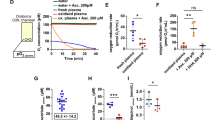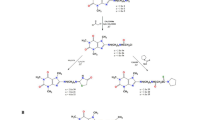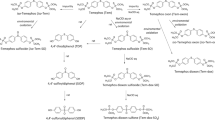Abstract
HEREDITARY methæmoglobinæmia, a rare disorder often associated with a deficiency in NADH-dependent ‘diaphorase’ activity1, has been treated successfully with methylene blue (1–2 mg/kg intravenously) or ascorbic acid (200–500 mg/day orally)2. Methylene blue probably effects the reduction of methæmoglobin by activating the NADPH-dependent methæmoglobin reductase that has been isolated, from human erythrocytes by Kiese et al.3 and by Huennekens et al.4. By serving as electron carriers between NADPH and the methæmoglobin reductase, methylene blue and other artificial electron carriers increase the activity of the hexose monophosphate shunt pathway of glucose metabolism5 and facilitate the reduction of methæmoglobin to hæmoglobin. This NADPH-dependent methæmoglobin reductase system is a reserve mechanism for the reduction of methæmoglobin, for the NADH-dependent ‘diaphorase’ system appears to be the physiologically important pathway in normal human erythrocytes. Ascorbic acid can reduce methæmoglobin to hæmoglobin slowly both in vivo and in vitro, probably through a direct effect on the methæmoglobin2.
This is a preview of subscription content, access via your institution
Access options
Subscribe to this journal
Receive 51 print issues and online access
$199.00 per year
only $3.90 per issue
Buy this article
- Purchase on Springer Link
- Instant access to full article PDF
Prices may be subject to local taxes which are calculated during checkout
Similar content being viewed by others
References
Scott, E. M., J. Clin. Invest., 39, 1176 (1960).
Lian, C., Frumusan, P., and Sassier, Bull. Mém. soc. med. hôp., Paris, 55, 1194 (1939). Barcroft, H., Gibson, Q. H., Harrison, D. C., and McMurray, J., Clin. Sci., 5, 145 (1945). King, E. J., White, J. C., and Gilchrist, M., J. Path. Bact., 59, 181 (1947). Gibson, Q. H., and Harrison, D. C., Lancet, ii, 941 (1947).
Kiese, M., Schneider, C., and Waller, H.-D., Arch. exp. Pathol. Pharmakol. Naunyn-Schmiedeberg's, 231, 158 (1957).
Huennekens, F. M., Caffrey, R. W., Basford, R. E., and Gabrio, B. W., J. Biol. Chem., 227, 261 (1957).
Brin, M., and Yonemoto, R. H., J. Biol. Chem., 230, 307 (1958). Szeinberg, A., and Marks, P. A., J. Clin. Invest., 40, 914 (1961).
Carver, M. J., and Ryan, W. L., Proc. Soc. Exp. Biol. and Med., 104, 710 (1960).
Harley, J. D., and Robin, H., Austral. J. Exp. Biol. Med. Sci., 40, 473 (1962).
Sass-Kortsak, A., Thalme, B., and Ernster, L., Nature, 193, 480 (1962).
Jaffé, E. R., J. Clin. Invest., 38, 1555 (1959); Blood, 21, 561 (1963).
Evelyn, K. A., and Malloy, H. T., J. Biol. Chem., 126, 655 (1938).
Waisman, H. A., Bain, J. A., Richmond, J. B., and Munsey, F. A., Pediatrics, 10, 293 (1952).
Eder, H. A., Finch, C., and McKee, R. W., J. Clin. Invest., 28, 265 (1949).
Author information
Authors and Affiliations
Rights and permissions
About this article
Cite this article
JAFFÉ, E., NEUMANN, G. A Comparison of the Effect of Menadione, Methylene Blue and Ascorbic Acid on the Reduction of Methæmoglobin in vivo. Nature 202, 607–608 (1964). https://doi.org/10.1038/202607a0
Issue Date:
DOI: https://doi.org/10.1038/202607a0
This article is cited by
-
Methylene blue can act as an antidote to pesticide poisoning of bumble bee mitochondria
Scientific Reports (2021)
-
Assessment of absorbed dose of gamma rays using the simultaneous determination of inactive hemoglobin derivatives as a biological dosimeter
Radiation and Environmental Biophysics (2020)
-
Biochemical Studies on Hemoglobin Modified with Reactive Oxygen Species (ROS)
Applied Biochemistry and Biotechnology (2011)
-
Methaemoglobin production in normal adults inhaling low concentrations of nitric oxide
Intensive Care Medicine (1994)
-
Mechanism of autoxidation of oxyhaemoglobin
Journal of Biosciences (1991)
Comments
By submitting a comment you agree to abide by our Terms and Community Guidelines. If you find something abusive or that does not comply with our terms or guidelines please flag it as inappropriate.



